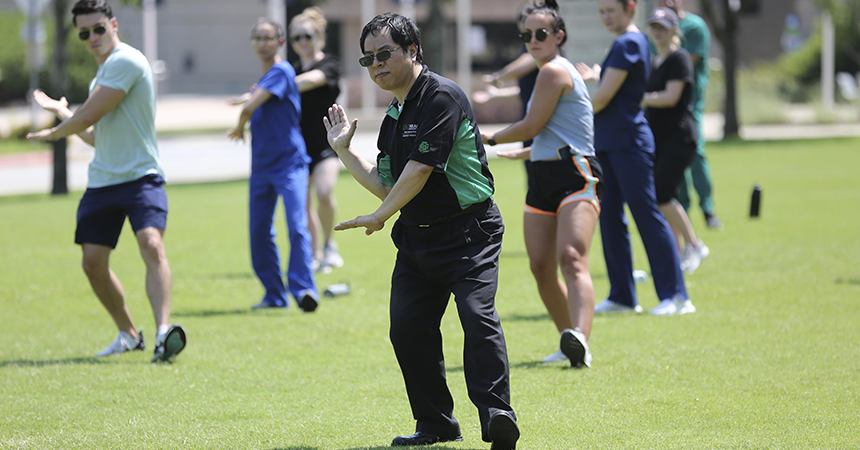‘Love Liu’ How one HSC professor is sharing his passion for teaching with future physical therapists

Dr. Howe Liu can identify potential underlying health conditions with clues from the human body – a cold hand, abnormal gait or posture.
When his keen eyes detect a physical dysfunction, Dr. Liu asks himself: “Which part of the body is causing that problem?”
The mysteries Dr. Liu solves are health-related and the answers help create better living conditions for geriatric patients who have survived strokes. He also helps patients who have been diagnosed with Parkinson’s disease, dementia, or multiple sclerosis.
“I really enjoy my life’s work – especially when seeing happiness in the people I have helped recuperate or recover from their medical conditions,” said Dr. Liu, adding that helping patients is the reason why he is a physical therapist.
Serving patients is a family tradition for Dr. Liu, whose parents were health professionals in China.
Dr. Liu, a professor of Physical Therapy at the School of Health Professions, holds several degrees, including a physical therapy degree and PhD in anatomy from the University of Mississippi. He also has a bachelor’s in medicine and a master’s degree in neuroscience while in China.
But physical therapy became his passion because of his deep knowledge of anatomy. It also provides Dr. Liu with more time to interact with patients – time that allows him to connect with them.
“I like clinically-oriented anatomy,” Dr. Liu said. “I love it. Anatomy is about the human structure. Anatomy is the most fundamental course for any other medical profession.”
Passion for students
Dr. Liu shares anatomy and clinical experiences with his HSC students. On campus, he is often seen leading outdoor Tai Chi classes offered to students in the top 20 percent of their HSC schools. Before the pandemic, Dr. Liu provided Tai Chi at local assisted living and retirement centers in DFW metropolitan area. He enlisted the help of students for this effort.
 In fact, inspiring students so they love anatomy and physical therapy is one of his core missions.
In fact, inspiring students so they love anatomy and physical therapy is one of his core missions.
Dr. Liu’s students give him good marks.
“LOVE LIU,” reads one evaluation for Clinical Anatomy I.
“He was always willing to go above and beyond for all of us even if he was exhausted,” another student wrote. “He was really encouraging and frequently checked up on his students.”
His students have also shown their appreciation with unique gifts, including thank you notes, a T-shirt that reads “Liu Energy,” and a cake.
“You go above and beyond for us, and we really appreciate it,” read the cake complete with a picture of Dr. Liu and strawberries.
Caring for patients
Like a human mechanic, Dr. Liu understands how the body works. If a patient is unable to move his or her arm after a stroke, he works to fix that condition with physical therapy.
Helping patients regain some level of physical activity is professionally and emotionally fulfilling, Dr. Liu said. These physical therapy triumphs fill him with awe.
“Wow, the patient shakes hands with you or a family member gives you a hug and thanks you so much,” he said recalling how families react to good news after physical therapy.
Years ago, he treated an 86-year-old patient at an Alabama nursing home who struggled with chronic heart failure. She was paralyzed.
Dr. Liu discovered that the paralysis was due to drugs so he worked with the physicians to change the medication. The patient’s medications were changed and she underwent physical therapy treatment. After six weeks, the patient could walk 100 feet – enough so she could walk to the nursing home’s dining hall.
The daughter had tears in her eyes, Dr. Liu said, adding: “I had tears in my eyes.”
In another case, a woman from Missouri passed out after a stroke during a visit to her daughter in Louisiana where Dr. Liu was a therapist. The woman, in her 80s, didn’t respond to external stimulation, Dr. Liu said.
However, when Dr. Liu learned the patient loved Gospel music, he got an idea.
“I asked her daughter for a Gospel tape,” he said, explaining that he played the music while the patient wore headphones.
At first, the patient was unconscious with no response. But soon there was progress.
“You see her finger moving like in a movie,” Dr. Liu recalled with a grin.
After several weeks, the patient opened her eyes. She smiled and her daughter had tears in her eyes.
Dr. Liu has focused research on the following areas:
“Effects of Inappropriate use of assistive ambulatory devices (AADs) on gait, balance, and posture; physical therapy and alternative therapeutic interventions (Tai Chi and Qi Gong) to improve gait, balance, and posture in older populations and AAD users; and cadaveric studies of potential peripheral nerve impingement.
When Dr. Liu is not conducting teaching, treating patients or conducting research, he is testing his Sudoku skills (he likes expert-level apps). He is a fan of Ping Pong, soccer, basketball and Alabama fried catfish. He’s lived and practiced in Mississippi, Louisiana, Alabama, Arkansas, and Texas.
Connecting with patients is the inspiration that ties all his efforts together in the classroom, he said.
“I like to link the classroom teaching with clinical practice,” he said. “I love physical therapy and physical therapy education.”
Your support is integral to advancing our innovation, patient care and education.






Social media